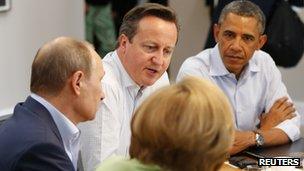G8 leaders 'close' to agreement on Syria
- Published

UK PM David Cameron is giving details of a joint statement on Syria, after a two-day G8 summit in Northern Ireland.
Leaders at the summit had significant differences on the raging conflict.
The statement was to have focused on the proposed peace conference in Geneva, and more access for deliveries of humanitarian aid.
The G8 leaders also issued a declaration, committing themselves to "fight the scourge of tax evasion".
The document - adopted on the final day of the summit - urges countries to "change rules that let companies shift their profits across borders to avoid taxes, and multinationals should report to tax authorities what tax they pay where".
It also says that "governments should roll back protectionism and agree new trade deals that boost jobs and growth worldwide".
The British government has tried to make tax, trade and transparency - the so-called "Three Ts" - focal issues of the two-day gathering.
'Not ambitious'
Earlier on Tuesday, Russian Deputy Foreign Minister Sergei Ryabkov told the BBC that Moscow would sign up to the statement on Syria later in the day.
But he stressed the Kremlin wanted each of the Syrian sides in the talks to select not only their own delegations but the future terms of any transitional government.
Mr Ryabkov sidestepped the question of whether this could leave open a role for President Bashar al-Assad in the future, reports the BBC's Bridget Kendall from the Enniskillen summit.
To try to get as much consensus as possible on Syria, UK Prime Minister David Cameron - who is hosting the summit - held a working dinner on Monday night.
The leaders were alone, with no officials present, allowing them to express their views frankly.
After the meeting, British officials appeared more optimistic that an agreement could be reached on the joint statement on Syria.
However, they said it would take more work to agree the precise language.
Earlier on Monday, the British had raised the possibility of the other G8 nations issuing an end-of-conference statement without the participation of Russia.
But it now seems that Mr Putin is willing to consider some kind of joint stance, according to officials.
The communique is likely to back the launch of Syrian peace negotiations in Geneva, and insist that humanitarian aid agencies like the Red Cross are given access to all parts of the country.
According to the BBC's UK political editor, Nick Robinson, the issue which is causing most difficulties for the G8 members is what they should say about the transition to a new Syrian government after any new round of peace negotiations.
Any statement which emerges may not be all that ambitious, correspondents warn - and even then, it is far from certain that any agreement will change the appalling reality in Syria itself.
Ransom deal
The White House announced last week that it would provide military aid to the Syrian rebels. Russia meanwhile supplies weapons to the government of President Bashar al-Assad.
Presidents Barack Obama and Vladimir Putin met for an hour of bilateral talks on Monday, and at a sombre press conference afterwards it was clear they had had a difficult exchange.
Both men acknowledged their differences but said they shared a common desire to stop the bloodshed.
The meeting between the two leaders at times appeared tense
"Of course, our opinions don't coincide. But all of us want to stop the violence and we have agreed to push the parties to the negotiating table," Mr Putin told reporters.
Mr Obama said they had instructed their teams to continue working towards hosting an international conference in Geneva that would aim to find a political solution to end the violence, which the UN says has left more than 93,000 people dead since March 2011.
In a separate interview with US broadcaster PBS, Mr Obama emphasised that "we're not taking sides in a religious war between Shia and Sunni" but aiming instead for a "stable, non-sectarian, representative government".
His interview coincided with a White House announcement that the US would provide a further $300m (£190m) of humanitarian aid for Syrians - split between Syria itself, where more than 4.25 million people have been displaced, and neighbouring countries dealing with the 1.6 million refugees.
In a separate development, Mr Cameron says a commitment has been secured from the G8 governments not to pay ransom to kidnappers.
This refusal has long been UK policy, but privately British officials have often expressed their frustration at alleged ransom payments being made to secure the release of French, Italian and other European hostages seized in the Sahara and elsewhere, reports the BBC's security correspondent Frank Gardner.
He adds that since those governments have never publicly owned up to paying ransoms, this G8 agreement may be easier to sign than to enforce.
- Published18 June 2013
- Published18 June 2013
- Published17 June 2013
- Published17 June 2013
- Published17 June 2013
- Published17 June 2013